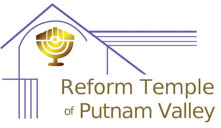I welcome you to RTPV just as you have welcomed me! I believe that spirituality and community are not found only within the walls of the sanctuary or even only within the Temple building, as inviting as it is. That is why I am looking forward to engaging with you in prayer, study and acts of loving kindness in varying venues as well as socializing together such as at one of my favorite endeavors: a monthly Lunch with the Rabbi at local restaurants. I believe that “low hanging fruit” meaning simple efforts, can make all the difference such as a homemade challah at Shabbat or storing frozen soup at Temple ready for those recovering from illness or learning the meaning behind a familiar prayer. I believe in partnering with interfaith and civic organizations in order to celebrate diversity and repair the world. I am looking forward to meeting and engaging with you!
